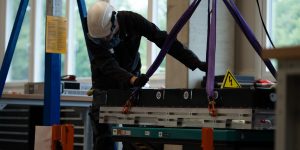
OEM
Be ready to EV Transition
Operator
Know your system. Control your uptime
Students
Gain new skills, apply at the market
Equips engineering and integration teams with progressive high-voltage expertise — from fundamental awareness to advanced diagnostics and live-work practices — ensuring compliance, safety, and smooth integration of battery systems into vehicles.
Prepares fleet technicians and safety managers with step-by-step HV qualifications, enabling them to safely operate, maintain, and troubleshoot electric vehicles from basic handling to complex high-voltage interventions.
Provides students and young professionals with structured high-voltage training — building knowledge from fundamentals to advanced practices — to prepare them for future careers in e-mobility and battery technology.
High Voltage Level 1 / Instructed Person (FuP) according to DGUV I 209-093 Level 1
Provides basic knowledge about high-voltage systems in vehicles. Raises awareness of the dangers of electric current. Enables participants to safely carry out supportive, non-electrical work in HV environments.

Employees who do not perform electrical work but operate near HV systems, e.g., body shop workers, painters, warehouse workers, cleaning staff, towing services, and employees in battery production.
High Voltage Level 2 / Qualified Person for High Voltage (FHV) according to DGUV I 209-093 Level 2
Qualifies participants to independently perform work on HV systems in a de-energized state. Covers construction, function, and safety requirements of HV systems. Essential for maintenance, disassembly, or initial diagnostics of HV components.

Professionals with electrical training or instructed persons with additional qualifications, e.g., automotive mechatronics technicians, electricians, master technicians, technicians with HV basics, trained battery factory employees with foundational knowledge.
Working Under Voltage on High Voltage Systems (AuS) according to DGUV I 209-093 Level 3
Qualifies participants for working under voltage (live working) on HV systems. Covers special protective measures, tools, and procedures. Essential for targeted troubleshooting or work on live HV components.

Electrical specialists who are to work on HV components under voltage, e.g., HV service technicians, development or diagnostic technicians, specialists in production, testing, or battery teardowns.